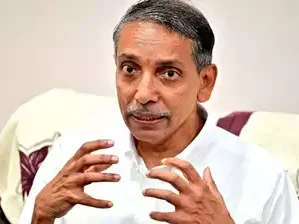UGC to allow students to complete degrees in two and half years
The University Grants Commission (UGC) is planning to allow students to complete three-year degree courses in two and a half years and four-year degrees in three years starting the next academic year (2025-26).
The commission would allow students to study at a slow pace and complete three-year degrees in four years, UGC chairman M Jagadish Kumar announced in Chennai on Thursday. He was speaking to reporters on the sidelines of the southern zone conference for autonomous colleges on the implementation of the National Education Policy 2020.
“Students, who are capable, can complete the degree programmes in a shorter duration in the coming years
We anticipate that they can gain six months to one year,” Jagadish Kumar said.
He said, “Despite opting for a slow-paced degree, if a student wants, he or she can still take a break from the course and come back later and complete it as courses have multiple entry and exit points.”
A committee headed by IIT Madras director V Kamakoti submitted the recommendations on accelerated and slow-paced degrees to the UGC, and it approved them on Wednesday.
Jagadish Kumar said detailed guidelines would be issued soon.
On introducing four-year degree programmes, the UGC chairman said it would give a lot of advantages to students. “In the fourth year, they can do some research projects, apply for patents and publish papers. We anticipate that the four-year undergraduate programme will be implemented across the country. Kerala and West Bengal have also introduced four-year degrees,” he added.
However, he did not give a direct answer when asked about Tamil Nadu’s opposition to the National Education Policy 2020. On the state’s effort to come up with a State Education Policy, he said, “NEP aims at making our students problem solvers and critical thinkers. We want them to be competent and to contribute to the growth of our country and Tamil Nadu state. If the goals are the same, you can call it by any name.”
On including UGC nominees in V-C search committees, he said, “The case is in the Supreme Court.
All universities must follow UGC regulations as court verdicts mentioned that it has supremacy over other laws. Therefore, a UGC representative has to be there in V-C search committees.”
Many Tamil Nadu universities, including Anna University and the University of Madras, have been functioning without vice-chancellors due to the standoff between the governor and the state govt on this issue. “Universities cannot run without their leaders.
You need vice-chancellors without much delay. They need to be appointed,” he said.
On the fund crunch of state universities, he said it's the responsibility of the state govt to fund them. He advised the institutions to raise their funds in ways like industry collaborations and other means.
The UGC chairman said 20 universities were under the scanner for producing poor-quality PhDs and violating the norms. “We called for all data related to PhD admissions to the award of degrees from 20 universities. If we find deficiencies in issuing PhD degrees, we will debar the institutions from giving PhDs,” Jagadish Kumar said
